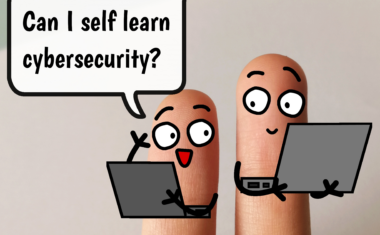How To Get Into Cybersecurity With No Experience [Job Guide]
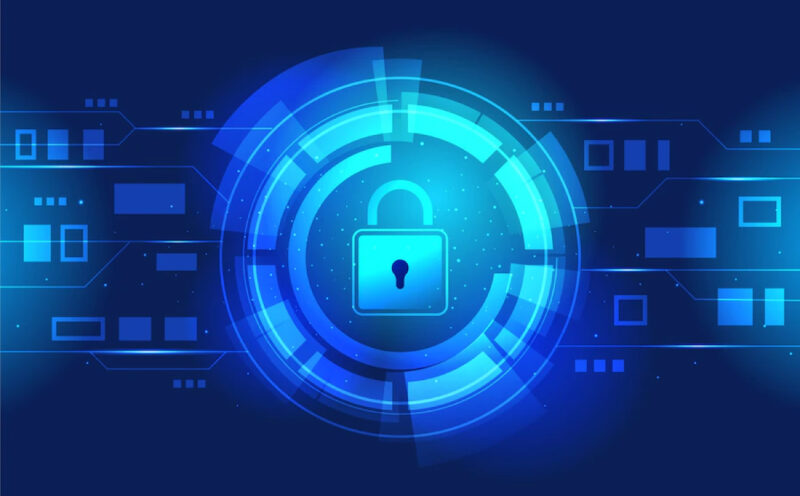
In this article
- Can You Get Into Cybersecurity Without Any Experience?
- What Does a Cybersecurity Analyst Do?
- How Can You Get Into Cybersecurity Without Any Experience?
- Essential Skills for a Cybersecurity Specialist
- 4 Entry-Level Cybersecurity Jobs You Can Get Without Any Experience
- How Can You Earn More When Getting Started in Cybersecurity?
- FAQs About Getting Into Cybersecurity Without Any Experience
Due, in part, to the rise in teleworking sparked by the COVID-19 pandemic, the demand for cybersecurity professionals in recent years has increased dramatically. In 2021, the global number of unfilled cybersecurity positions reached 3.5 million, and this number is predicted to stay unchanged until 2025. In other words, the world is desperate for cybersecurity professionals.
So if you’re interested in a cybersecurity career, but don’t have the years of experience that so many jobs require, then you’re in the right place. This guide will cover everything from the education you need and certifications that will get you noticed, to network building and deepening your knowledge of the industry.
Can You Get Into Cybersecurity Without Any Experience?
Yes! When it comes to landing a cybersecurity job, hiring managers are most concerned with the skills you have and the certifications you’ve completed.
What Does a Cybersecurity Analyst Do?
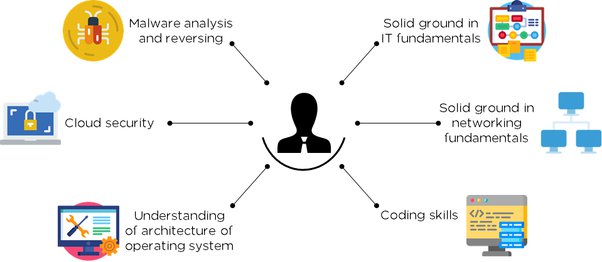
Source: Quora
A cybersecurity analyst designs systems and protocols to stop cyberattacks before they happen. In addition to identifying vulnerabilities, cybersecurity analysts also train other employees in good security practices. Criminals can target employees and take advantage of their lack of knowledge, so it’s important to make sure everyone in the organization understands the fundamentals.
How Can You Get Into Cybersecurity Without Any Experience?
-
Get Acquainted With the Fundamentals
-
Take Advantage of Online Resources
-
Find a Specialization and Ideal Career Path
-
Complete a Bootcamp
-
Pursue a Certification
-
Gain Some Practical Experience
-
Find a Mentor
-
Build a Strong Network
-
Personalize Your Resume and Apply for Entry-Level Jobs
You can still get a cybersecurity education without a college degree. Here’s what that looks like:
Get Acquainted With the Fundamentals
If you’re completely new to this field, you’ll need to start at the beginning. This means studying the techniques cybersecurity professionals use to protect their company’s network and data. Here, we’ll list the main areas you’ll need to gain knowledge in the following:
Confidentiality, Integrity, Availability (CIA Triad)

Source: Wallarm
The CIA triad is a model that outlines the three most fundamental elements of an effective security policy.
Confidentiality refers to the rules that restrict access to information, integrity guarantees the reliability of the information, and availability ensures the people who need the information have access to it.
Risk Management
Weaknesses cannot be dealt with until they are identified. Risk management refers to the process of finding, analyzing, and monitoring potential security risks.
Data and Network Security
A catch-all term for the systems that protect a company’s network and data. This can refer to both software and hardware, plus the protocols put in place to restrict and access data.
Security Control
Security control is the term used to describe a measure that aims to protect the confidentiality and integrity of a set of data.
Threat and Vulnerability Assessment

This refers to the analysis of a company’s systems to determine vulnerabilities and identify high-threat areas.
Recovery
Recovery refers to the procedures used to restore data that has been lost or compromised during an attack or system failure.
Take Advantage of Online Resources
The internet is a treasure trove of resources for students of cybersecurity. The extra knowledge you can gain from self-studying cybersecurity can really set you apart from those who only complete the required coursework.
Courses
Here is a small selection of free beginner cybersecurity courses available to you online:
- Introduction to Cybersecurity by edX
- Introduction to IT & Cybersecurity by Cybray
- Computer Systems Security by MIT
- Cyber Aces Free Cyber Security Training Course by Sans
Blogs, Podcasts, and YouTube Videos
These blogs, podcasts, and videos are a great way to supplement your education:
- CSO Online: A cybersecurity blog.
- The Last Watchdog: Blog posts and podcasts on cybersecurity topics.
- The Hacker News: A website that covers the latest cyberattacks and malware.
- John Hammond: A YouTube channel covering cybersecurity topics.
Online Communities
- TryHackMe: A Discord server for sharing cybersecurity resources, with over 140,000 members.
- Netsec Focus: An online community for cybersecurity professionals and enthusiasts to share knowledge and experiences.
- TrustedSec: A public Slack channel for cybersecurity enthusiasts.
Get To Know Other Cybersecurity Students
Dylan Wood
Cybersecurity Career Track Student at Springboard
Vianey Luna
IT Security Specialist at Cooper Machinery Services
Dipen Patel
Cybersecurity Analyst at Accenture
Find a Specialization and Ideal Career Path
Technology is used by companies in every country and most industries, which means there are a lot of places you can go as a cybersecurity professional.
Researching the kind of work you want to do and what kind of company you want to do it at is a crucial step in your journey toward entering the industry.
Complete a Bootcamp

College degrees are not the only accepted form of education when it comes to the tech industry. Everyone has their own learning preferences, and it’s okay to follow the path that works for you.
A popular alternative to the college route is completing an online cybersecurity bootcamp.
A good cybersecurity bootcamp for beginners will be taught by industry professionals and can take eager cybersecurity enthusiasts from total beginners to job-ready graduates in a matter of months.
Pursue a Certification
Certifications provide a standard of knowledge and skill that is very helpful for companies during the hiring process. In the cybersecurity industry, certifications are particularly important, and many high-paying jobs will require certain certifications alongside education.
For junior and intermediate roles, we recommend these three certifications:
CompTIA Security+

The CompTIA Security+ certification verifies your skills in the foundations of cybersecurity and confirms your capability to thrive in a professional role. It’s recognized globally and is rather well known—you’ll likely see it many times during your job searches. The certification includes a performance section that tests your hands-on skills.
GIAC Security Essentials Certification (GSEC)

The GIAC Security Essentials certification requires applicants to demonstrate that they are qualified for a professional role in cybersecurity. The exam uses GIAC’s original testing platform CyberLive, which creates a hands-on, real-world environment for practical tests.
Cybersecurity Fundamentals Certificate (ISACA)

This Cybersecurity Fundamentals Certificate by ISACA offers an optional online course that teaches the skills and knowledge required to pass the final exam.
Gain Some Practical Experience
Practical experience is extremely valuable both for your development as a cybersecurity professional and your resume. However, practical experience does not have to be paid experience.
Volunteer Work
There are many other ways to practice your cybersecurity skills in a real-world and collaborative setting. Here are some of our recommendations:
In a world where cybersecurity is needed by many, but not everyone has access to it, volunteer projects are easy to come by. There are even organizations that provide free cybersecurity to charities that can’t afford it for themselves.
Pursue an Internship
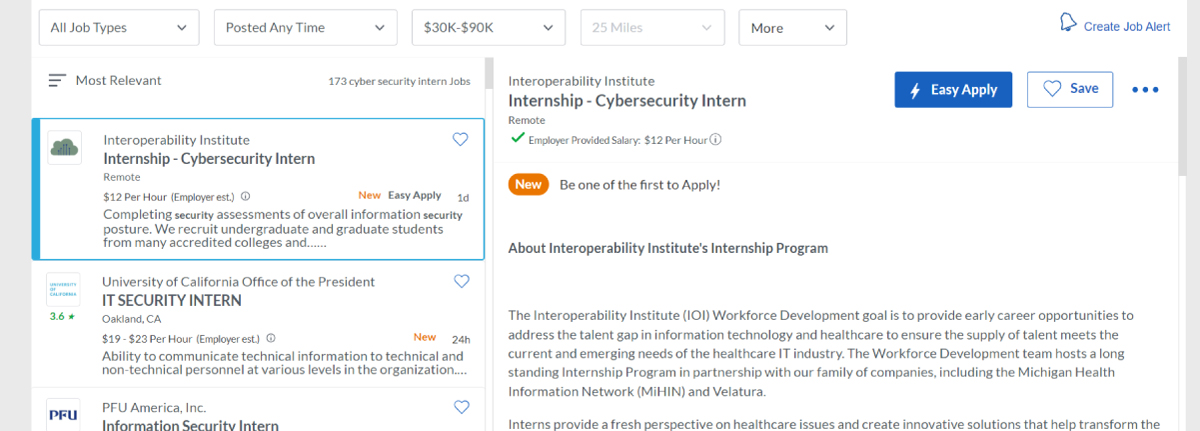
An internship is an ideal way to gain practical experience before your first job in cybersecurity. They can sometimes be hard to come by, so make sure to check sites like Indeed and Glassdoor frequently as you work through your education.
Work on Independent Projects
Open-source cybersecurity projects are a great way to practice and develop your skills. High-profile projects can even be included on your resume, as interviewers will likely have experience with them as well.
Build a Portfolio
A portfolio is a useful tool when it comes to landing interviews without experience. They are best made over time, so we recommend getting started on your cybersecurity portfolio projects as soon as you can.
Find a Mentor
There is no right way to find a mentor, and a valuable mentorship does not need to be official, either.
Whether it’s through an internship or school, finding a skilled professional who is willing to answer your questions will be highly beneficial for your development.
Build a Strong Network
A good network can provide endless value, including future job opportunities.
LinkedIn is a crucial tool for network building. Regardless of whom you meet or how you meet them, sending out an invitation to connect on LinkedIn is always appropriate.
Communities and Conferences
The online communities mentioned earlier are a perfect place to begin your networking efforts. You can also take advantage of both online and on-site cybersecurity events and conferences where high numbers of professionals will gather.
Personalize Your Resume and Apply for Entry-Level Jobs
When you begin searching for jobs, a really useful tip is to personalize your resume for each application you make. Read through the job description, research the company, and angle your resume towards its exact needs.
This will help your resume stand out, as it will include a high number of keywords and skills that recruiters have been instructed to look for.
Essential Skills for a Cybersecurity Specialist
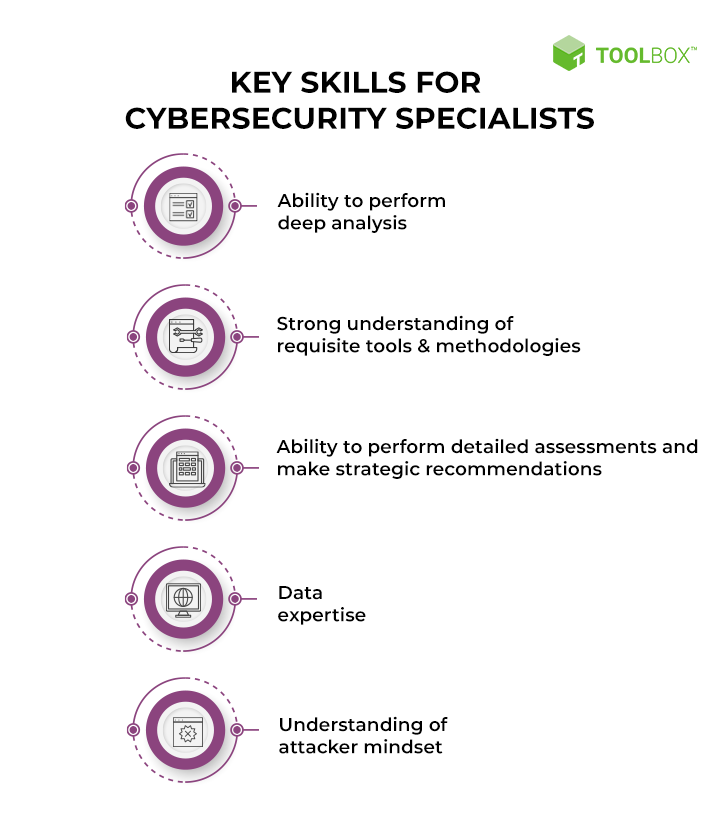
In this section, we’ll provide a list of the fundamental skills you’ll need to cover before you’re ready for your first job. This skills list can also be useful for writing resumes, personal statements, and cover letters.
Technical Skills
A cybersecurity expert must be skilled in the following areas:
Programming Languages
Software is a critical element in any cybersecurity system. You’ll need to use a programming language like Python in order to write software and identify its vulnerabilities.
Operating Systems
The operating system used by a company will greatly influence how its security system is designed and how you will interact with it.
In order to maximize the number of job adverts you can respond to, it’s best to gain experience with Windows, macOS, and Linux operating systems.
Risk Management
Identifying threats, flaws, and vulnerabilities is one of the day-to-day responsibilities of a cybersecurity professional.
Incident Response and Handling
Knowing how to handle incidents and minimize their negative impact is a key skill that will be useful in any role.
Security Architecture
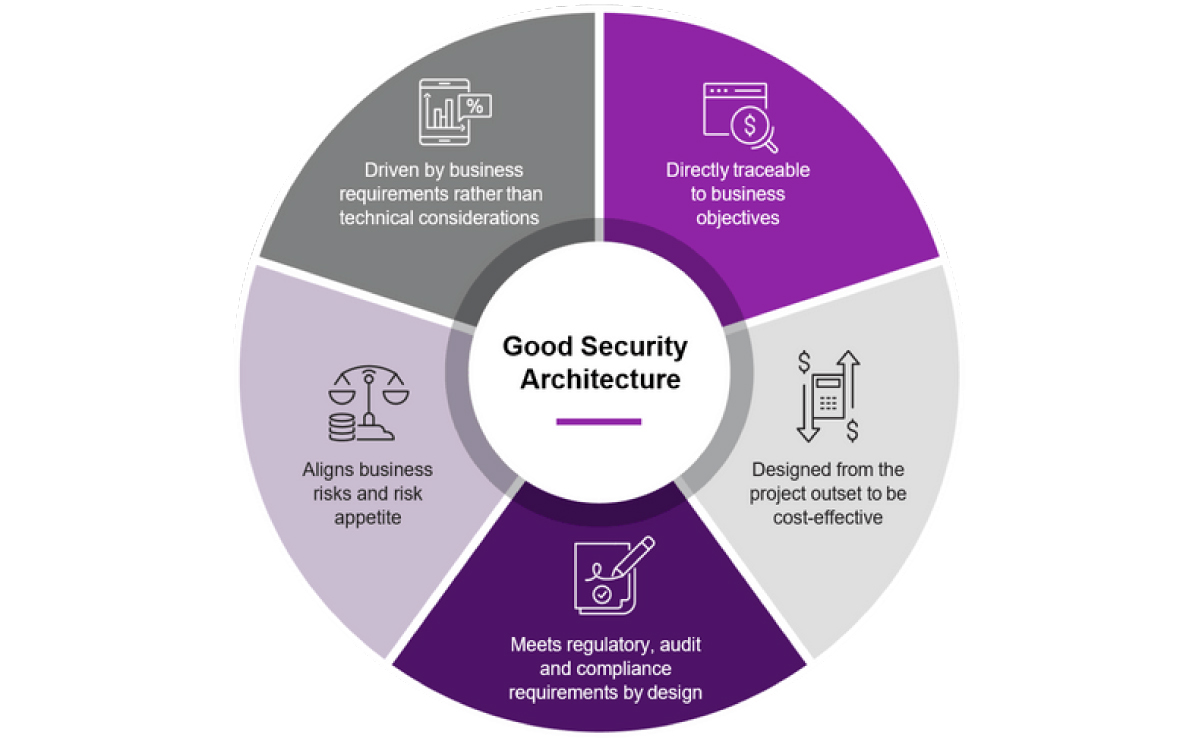
Source: Dig8bital
The first thing you will need to do when you land your first job is to get familiar with the security protocols of your company. Knowing the industry standards and up-to-date trends in security architecture will be essential for this task.
Reverse Engineering
When a security breach happens, it’s sometimes necessary to reverse engineer the malware that was used in order to understand how it works and how you can defend against it.
Cryptography
Cryptography refers to the study of secure communication, so you should be well versed in the ways in which messages and information can be transformed and hidden from anyone but the intended recipients.
Analytics
A cybersecurity professional is not simply hired to fix security flaws, but to find them as well. Skills in analytics will enable you to perform tests and functions that detect and mitigate threats to your security network.
Soft Skills
These are the people and practical skills that allow you to navigate and bring value to a professional environment.
Problem Solving
Many elements of cybersecurity responsibilities, such as risk management, reverse engineering, and analytics, require excellent problem-solving skills.
Critical Thinking
Everyone has critical thinking capabilities, but what really makes this a skill is the ability to apply it everywhere and at all times.
Communication
Communication is an essential skill within any collaborative work environment. No matter how skilled you are, you won’t be able to maximize the value you bring to a team without good communication skills.
Flexibility and Adaptability
Hackers are constantly finding new ways to steal private information, so it’s important that cybersecurity specialists stay up to date on the latest developments.
Accuracy and Attention to Detail
Producing accurate work is a necessity in cybersecurity, as any mistakes you make may be exploited by cybercriminals.
Stress Management
When an attack does happen, cybersecurity professionals must work in a high-stress environment to combat the situation. It’s important to be able to keep a cool head in order to work efficiently and reduce stress.
Persistence
Malware and cyberattacks are created by talented individuals, and defending against them is not always straightforward. A cybersecurity analyst needs to be able to keep chipping away at a difficult problem until it’s solved.
Teamwork
When you work in a team, no job is truly done in isolation. Collaboration is a constant. You and your peers will check each other’s work frequently, so teamwork is an important skill.
4 Entry-Level Cybersecurity Jobs You Can Get Without Any Experience
Cybersecurity branches into various niches and separate roles which are filled by senior team members.
For juniors with no experience, the best roles to apply for are general roles with a broad range of responsibilities. Here are our top picks:
Information Security Analyst
As an information security analyst, you’ll contribute to the protection of company assets by analyzing data for current and emerging threats.
Skills you’ll need:
- Risk management
- Analytics
- Teamwork and communication
- Identity and access management
Salary averages at $76,657 per year in the first year of work.
Source: Indeed
Incident Analyst/Responder
Incident responders monitor real-time security alerts and respond to cybersecurity alerts as they happen. After resolving the problem, you’ll also need to create countermeasures to prevent it from happening again.
Skills you’ll need:
- CompTIA Security+
- Stress management
- Industry tools (e.g Splunk, MS Excel)
- Knowledge of incident response operations
Salary averages at $61,657 during the first year of work.
Source: Glassdoor
IT Auditor
It’s an IT auditor’s job to prepare companies for the third-party audits they receive, by ensuring they are in compliance with industry standards.
Skills you’ll need:
- Analytics
- Knowledge of security and privacy protocols
- Communication (with auditors and customers)
- Report writing
The salary is around $69,715 during the first year of work.
Junior Penetration Tester
A penetration tester focuses on the ethical hacking of company systems. This involves using the techniques favored by cybercriminals to attack your own network and trying to pinpoint weaknesses.
Skills you’ll need:
- Problem-solving
- Reverse engineering
- Teamwork
- Accuracy and attention to detail
Salary: $80,406 during the first year on the job.
How Can You Earn More When Getting Started in Cybersecurity?
Here are some ways to develop your career during your first junior role.
A Degree
Degrees are not an absolute requirement anymore, but it can still be beneficial to have one, as it’ll help you command a higher salary.
Experience
If you’ve already landed your first cybersecurity job, then try freelancing to gain some more experience.
Networking
Getting to know your colleagues and attending events will allow you to take advantage of networking opportunities in the industry.
FAQs About Getting Into Cybersecurity Without Any Experience
Here are some FAQs on how to land your first cybersecurity role without experience.
Is Cybersecurity a Good Career?
Yes. Due to the 3.5 million jobs available worldwide, a career in cybersecurity will provide you with plenty of work opportunities wherever you go.
There is also ample opportunity to rise through the ranks, with top cybersecurity expert salaries reaching as high as $285,000.
Does Cybersecurity Require Coding?
Yes. Coding is a big part of a cybersecurity professional’s skill set. In a typical cybersecurity role, you’ll work with and design cybersecurity software to uncover and protect against potential vulnerabilities.
A common programming language used in the cybersecurity field is Python.
Can I Get Into Cybersecurity Without a Degree?
While four-year degrees are undoubtedly still useful in the current climate, they are not an absolute requirement.
You can develop your skills through cybersecurity boot camps, open projects, volunteer work, and portfolio building to land yourself an entry-level position.
Can a Non-Technical Person Learn Cybersecurity?
Cybersecurity is a technical field, but any non-technical person can become technical by learning cybersecurity basics.
Soft skills are also highly important, and there are project management roles that focus more on management skills than technical skills.
Related Read: How To Get Into Cybersecurity Regardless of Your Background
How Do I Know if Cybersecurity Is for Me?
The only way to know is to try it out. From free beginner courses, to interesting blogs and fun YouTube channels, there are many easy ways to ease yourself into the field of cybersecurity without initially committing too much time or money.
Since you’re here…
There are hundreds of thousands of vacant cybersecurity jobs, and one of them has your name on it. You can enter the industry in 6 months flat with our Cybersecurity Course. We’ve helped over 10,000 students make huge career changes with our fully flexible mentor-led bootcamps. Explore our free cybersecurity curriculum today to start your career switch story.





